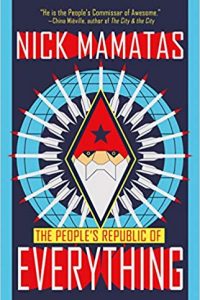Gary K. Wolfe reviews Leena Krohn
For the past decade or so, thanks in part to the well-received work of writers like Johanna Sinisalo and Hannu Rajaniemi, Finnish SF and fantasy seem to have enjoyed a bit of a renaissance, at least in terms of availability to English readers (like all such renaissances, it’s probably just one that we didn’t know about earlier). Now Cheeky Frawg, the cheeky imprint from Ann and Jeff VanderMeer which brought us Swedish writer Karin Tidbeck’s award-winning collection Jagannath, is offering a small feast of Finnish fiction, including an e-book anthology It Came from the North edited by Desirina Boskovich, an e-book reprint of Leena Krohn’s World Fantasy nominee Tainaron, and, immediately to hand, Krohn’s episodic novel from 2001 Datura (Or a Delusion We All See) and a slim collection The Explorer and Other Stories by Jyrki Vainonen, drawn from the author’s three earlier Finnish-language collections. Especially in terms of Krohn’s novel, the news from Finland remains something of a revelation.
Datura, which takes its title from a flowering plant whose seed pods come to take on a more than metaphorical meaning as the tale unfolds, begins with the narrator offering us the Dickian proposition that ‘‘reality is nothing more than a working hypothesis.’’ She certainly has the right job for that attitude, working for a sensational paranormal magazine called The New Anomalist (which to an American reader sounds like nothing so much as Fate magazine, founded decades ago by pulp editor Ray Palmer after he discovered he couldn’t even fob this stuff off on SF readers). The publisher, known only as the Marquis, sees himself as a skeptic and rationalist simply taking advantage of a gullible market, but the magazine’s readers are a colorful mix of lunatics and crackpots – a self-described ‘‘Master of Sound’’ whose invention picks up sounds inaudible to humans (much like Roald Dahl’s ‘‘The Sound Machine’’), another who collects Charles Fortean coincidences (but seems oblivious to those all around him), an ‘‘Ethnobotanist’’ convinced of the intelligence of plants, a ‘‘pendulum man’’ who thinks he can detect bad food by swinging a pendulum over it, a ‘‘hair artiste’’ getting her doctorate in hairstyling, a woman who thinks she sees the face of her Lord in a baked cheese, a self-proclaimed vampire, a trepanation nut who believes all ills can be resolved by drilling a hole in your skull, a boy with an amputation fetish, etc. The Marquis complicates the narrator’s life further by assigning her to do special interest articles on such things as the Voynich manuscript, Nicola Tesla, and an extreme fetish sex club, and by asking her to manage a mail-order ‘‘parastore’’ selling tacky New Age products.
But the narrator’s life gets complicated in other ways, too, as though some of the anomalies the magazine promotes are leaking into her own experience. Walking home across a footbridge one night, she witnesses a phalanx of driverless cars pass underneath in rigid formation; she’s haunted by an old woman who manages to disappear whenever approached; a tram ride seems to take her several decades into the past; she chats with an insufferably bigoted acquaintance only to learn the woman had died weeks earlier. Is her own reality unraveling into the contingent realities of her loony clients? And was does all this have to do with the datura plant that her brother and sister-in-law gave her back at the beginning of the narrative (and which provides the book’s section titles ‘‘The First Seed Pod’’, etc.? The resolution might not be what Philip K. Dick fans would expect, but the path to get there is captured in sometimes luminous prose by the translations of Anna Volmari, J. Robert Tupasela, and Hildi Hawkins – translations which also capture the delightful manic humor of much of the book as well as its delicately balanced shifts in tone.








